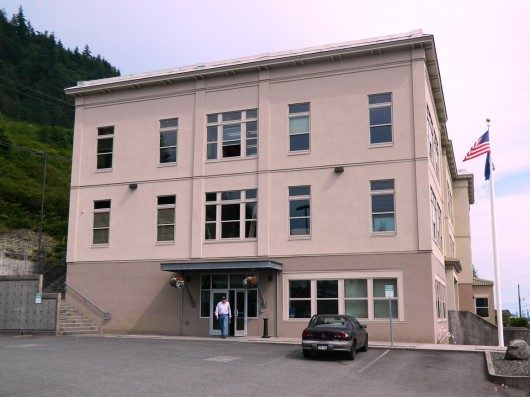A rezone request that would allow a new gun manufacturing and shooting range business in the Ward Cove area was postponed Monday by the Ketchikan Gateway Borough Assembly.
The motion will come back to the assembly in early November, along with a proposed code change that provides standards for development of gun ranges in the future.
Borough Planning Director Richard Harney said the code doesn’t address gun ranges, and he wants to have a public process to create those standards.
“We have it slated to have a discussion with the Code and Planning Committee on Aug. 27 at noon; and the later that evening also have a discussion with the Planning Commission regarding gun ranges,” he said. “So we already have that programmed in to both those agendas to discuss.”
That would start the code amendment process, he said. If everything goes perfectly, Nov. 4 would be the soonest a code change could come before the assembly.
Some of the concerns noted by the assembly included noise and public safety.
Carl Smith is the rezone applicant. He said they did some testing. At the proposed site, the noise from guns was about 89 decibels. At the Alaska State Troopers post just up the hill from the site, he said it was 75, which is comparable to the human voice.
Smith said if there are a lot of complaints about noise, they could put suppressors on the weapons.
He told the assembly that he plans to construct ranges with bullet traps and overhead baffles to catch any ammunition. Smith said he is planning a small indoor range, and an outdoor range, and noted that safety will be a major priority.
“We will have range masters and range attendants in every case. This is not going to be a free-for-all like the existing range is,” he said. “Comparing this to that one is like comparing grapes and watermelons. It’s a totally different scenario.”
The existing gun range on D-1 Loop was in place before the code was written, so it was “grandfathered” in. Any new regulations would not apply to the D-1 range unless that range was significantly altered or renovated.
On the manufacturing side of the planned new business, Smith said the biggest market he sees is for law enforcement.
“So we’ll start manufacturing Glock and AR-15 platforms,” he said. “That hopefully will evolve to other things as locals get interested and we see more opportunity.”
Smith said he’s invested a lot of money into developing the business, and he’d like to get started sooner rather than later.
Borough Manager Ruben Duran said he wants the borough to go through a code change with a public process because borough code currently is silent on the topic of gun ranges.
“We really should have those standards articulated, and the public process occurs for individuals to speak about what those standards are,” he said. “And then we go forward.”
The motion to postpone until Nov. 4 passed 5-2 with Assembly Members Alan Bailey and Judith McQuerry voting no. Bailey wanted to give borough staff more time to bring the motion back, and McQuerry wanted to deny the rezone outright, and have the applicant bring back a fresh proposal after the code change is accomplished.
Also Monday, the assembly approved a motion to increase the single-item sales tax cap from $1,000 to $2,000. Finance Director Cynna Gubatayao notes that state budget cuts mean local costs will increase.
“The school bond debt reimbursement program has been cut to 50 percent of its original funding,” she said. “That is $1.17 million to us this year that we’ve lost. That’s going on now into future years for us as well.”
She said that’s on top of other cost increases.
Assembly Member Sue Pickrell was the only vote against raising the sales tax cap. She argued that it will harm local businesses and their ability to compete.
The tax cap has meant that any single item purchased locally is taxed only on the first $1,000 of the sales price. The change means those items will be charged tax for the first $2,000 of the sales price, instead. Residential rent is exempt from the increase.
The Ketchikan City Council will consider a similar motion during its Sept. 5 meeting.






